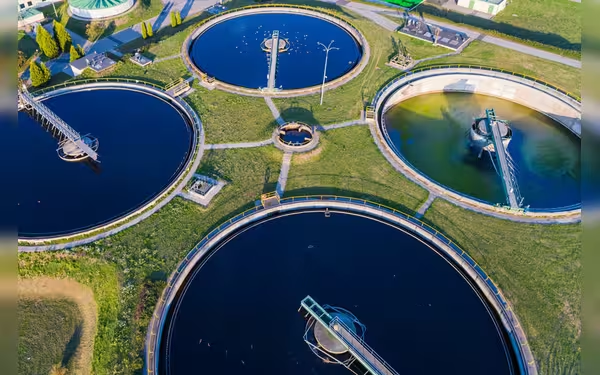Saturday, November 16, 2024 05:52 PM
Saudi Arabia and Denmark Collaborate on Sustainable Wastewater Management
- Saudi Arabia partners with Denmark for wastewater solutions.
- Danish firms introduce innovative water management technologies.
- Focus on sustainability aligns with Saudi Vision 2030.
 Image Credits: arabnewspk
Image Credits: arabnewspkSaudi Arabia partners with Denmark to enhance wastewater management and sustainability, addressing critical water challenges for the Kingdom's future.
Saudi Arabia is facing a significant challenge when it comes to managing its water resources. With a rapidly growing population and limited natural water supplies, the Kingdom is turning to international experts for help. One of the countries stepping up to the plate is Denmark, known for its advanced wastewater management techniques. This partnership aims to improve water sustainability and treatment infrastructure in Saudi Arabia, which is crucial for the Kingdom's future.
As the population in Saudi Arabia has surged from 25 million in 2007 to nearly 33 million in 2018, the demand for freshwater has skyrocketed. Unfortunately, only a small percentage of wastewater generated in cities like Dammam, Riyadh, and Jeddah is treated and reused. For instance, a report from King Saud University revealed that only 78 percent of wastewater in Dammam is treated, while the figures drop to 60 percent in Riyadh and just 50 percent in Jeddah. This situation highlights the urgent need for effective wastewater management solutions.
To tackle these issues, Saudi Arabia is collaborating with Danish companies such as Danfoss, Grundfos, and AVK. These firms bring a wealth of knowledge and innovative solutions to the table. Jacob Vind, a water industry expert from Danfoss, emphasized the seriousness of the water scarcity issue in the region, stating, "We are in reality in the midst of an extremely serious and pervasive water challenge. There is not enough water." This statement underscores the importance of adopting advanced water management technologies to meet the growing demand.
Denmark has a long-standing reputation for its effective wastewater management policies. The country has developed a robust infrastructure that includes advanced filtration, treatment, and energy recovery processes. Danish firms are introducing solar-powered pumping systems in Saudi Arabia, which are particularly beneficial for remote areas lacking access to electricity. Morten Riis, a senior director at Grundfos, explained that their solutions not only target groundwater and rivers but also focus on minimizing water loss and optimizing energy use. He stated, "We have intelligent solutions that can reduce not only the water loss but also reduce the use of energy due to managing the pressure in the water system." This innovative approach is essential for ensuring a sustainable water future in Saudi Arabia.
Moreover, the wastewater treatment process itself is quite intricate. It involves several stages to ensure that the treated water meets safety standards for various uses, including irrigation and industrial processes. The process begins with preliminary treatment, where large debris is removed. This is followed by primary treatment, where smaller solids settle to form sludge. Secondary treatment introduces aeration to stimulate microbes that break down organic matter, while tertiary treatment further filters and disinfects the water, making it safe for irrigation and industrial use. Some systems even incorporate advanced treatment methods like reverse osmosis and UV filtration to ensure the water is safe for human consumption.
However, sustainability does not solely rely on treatment processes. It is equally important to protect freshwater sources. Tanya Gottlieb Jacobsen from the Danish consultancy State of Green pointed out, "We get our drinking water from groundwater, so we focus on prevention, and we always have a strategy on prevention being better than advanced treatment for drinking water." This holistic approach aligns with Saudi Arabia's Vision 2030 goals, which emphasize economic diversification and environmental stewardship.
The partnership between Saudi Arabia and Denmark in sustainable wastewater management is a promising step towards addressing the Kingdom's water challenges. By leveraging Danish expertise and innovative technologies, Saudi Arabia is not only working to improve its water infrastructure but also taking significant strides towards a more sustainable future. As the Kingdom continues to adopt these advanced solutions, it is paving the way for a more secure and efficient water management system that can support its growing population and environmental goals.













